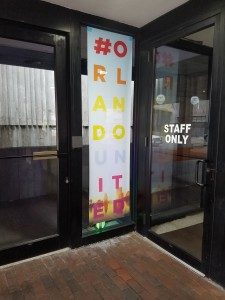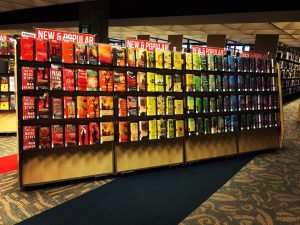As many of you know I often post about The Empathetic Museum (by the way, those of us working on that project now have a new website). At the AAM Conference in Washington, DC in May, I met Laura-Edythe Coleman, a follower of Empathetic Museum posts and a professional involved in both the museum and library worlds. We began talking about the differences between museums and libraries when it comes to empathetic responses to community issues. Laura-Edythe had lots of ideas to share, so I invited her and her colleague Abigail Phillips to write a guest post. Here it is, and I hope it will generate thought and discussion about some systemic differences between museums and libraries and the ways in which they engage with their communities. You can send comments to this posting or on Twitter to @abigailleigh, @lauraedythe, or @gretchjenn.
Guest post by AbigailPhillips and Laura-Edythe Coleman
Libraries and librarians are not simply nestled in their communities, they are inter-woven into the fabric of the society in which they exist. Such community connection is evident in the high level of empathy practiced by librarians: libraries and librarians across the United States have a vibrant relationship with the people who live nearby. During everyday practices in the library, librarians provide empathetic services to their patrons. Librarians are trained, largely on the job, to be engaged, compassionate, and attuned to the needs and wants of their communities. Without empathy, it is challenging to determine the types of services and programming that a library’s community is more in need of. In recent years, empathy has been investigated within the context of community libraries. These studies have looked at how librarians provide empathy and how they have (or haven’t) been trained to do so within professional boundaries. While there is still much work to be done regarding the professional development of empathetic librarians, great strides have been made within the past decade to ensure that libraries and librarians are more attentive to their changing communities and patrons.

Banner at Orange County Library System, Orlando
Librarians, individually and collectively as the American Librarian Association (ALA), have responded in an appropriate and timely fashion to societal problems (For example, the ALA response to the Orlando Pulse Shooting). The Orange County Library System in Orlando, Florida provides to all patrons: connections to social services for those impacted by the shooting; books on grief; and places of memorial.

New & notable books arranged in rainbow to greet library patrons. Orlando Public Library
In contrast, museums struggle to respond to societal issues, and when museums do attempt to mitigate societal ills, these attempts can appear forced upon the museum community – something that is done out of guilt or a need to satisfy the demands of a highly charged political climate, not the needs of the community surrounding the museum.
How is it that libraries and librarians so seamlessly connect with their communities? How do librarians empathize with such ease? Our base tenet for this article is that librarians and librarianship possess an inherent philosophy that matches a practice to promote empathy. This philosophy is prevalent throughout the LIS community, in part due to the professional training of librarians and the strength of the librarian professional community. One example of empathy in librarianship comes from S. R. Ranganathan’s Five Laws of Library Science. Ranganathan, a mathematician and librarian, created these laws in the 1930s: First, books are for use. Second, every reader has his/her book. Third, every books its reader. Fourth, save the time of the reader. Fifth, the library is a growing organism. Empathy is a part of each of these laws, reflecting a deep understanding of library patrons. Through these laws, Ranganathan steps beyond the library as an unchanging institution devoid of emotions. Instead, libraries are ever changing and possess a desire to relate to and reflect its users.
Librarians and museologists arrive at the profession through very different pathways: librarianship emphasizes a professional degree, the masters of library science (MLIS or MLS). In stark contrast, museologists tend to have a subject content degree relative to the collection with which they work (e.g. archeology, anthropology, history, art, art history). This fundamental difference in professional training inevitably leads to the existence of significant constraints upon museologists. It is important to note that the differences between librarians and museum professionals are visible even at the highest level: the professional organizations. The American Library Association (ALA) accredits American and Canadian MLIS programs, training programs, and similar certifications, while the American Alliance of Museums (AAM) accredits museums, not museum professionals or museology training programs. The AAM emphasis upon the institution’s responsibility to ethics automatically results in a lack of personal, individual responsibility to ethical conduct. The differences between the code of ethics for these two professional organizations, ALA & AAM, are startling: ALA professionals affirm service to the individual patron through their first tenet that “We provide the highest level of service to all library users…” The code of ethics of AAM, on the other hand, emphasizes the “governance,” “collections,” “programs,” “promulgation” of museums. Not only are museums, as institutions, solely responsible for ethical behavior, the recipient of museum services is not necessarily the individual museum patron or even the surrounding community. For the museum professional, it is fundamentally difficult to be empathetic due to the nature of the profession: quite simply, we are not trained to be ethically responsible for a relationship with our patrons.
How can we, as museum professionals follow the example of librarians? To become more empathetic and ethically responsible? First, we need to acknowledge that in general, museums are reluctant to become a part of a historical narrative, instead museums often engage in the presentation of history. Second, we need to let go of the idea that we only preserve history; not participate in the making of collective memory. Museum professionals often profess to being “neutral” but this is a false assumption – no one, no matter how professional, is “neutral.” Third, we need to connect to our community and emphasize the importance of relationships over presentation of exhibits, objects, and narratives. Fourth, we need to trust our community to construct their own conclusions about our objects and exhibits. Fifth, we need to invest in accredited professional training for the next generation of museologists – we simply cannot afford to ignore the need for empathetic museum professionals.
In conclusion, we know that there is a growing desire for museum professionals to be more like their empathetic librarian counterparts, #IcrossedthelineatAAM, but what is holding us back?
http://www.aam-us.org/resources/ethics-standards-and-best-practices/code-of-ethics
http://www.ala.org/advocacy/proethics/codeofethics/codeethics
Biographical information:
Abigail Phillips recently received her Ph.D. from the School of Information at Florida State University. Prior to entering the doctoral program, she worked as a public librarian for a small, rural library system in Southwest Georgia. Dr. Phillips’ research interests include young adults, cyberbullying, social media, digital citizenship, libraries, and librarianship. She can be reached via Twitter: @abigailleigh, blog: abigailleighphillips.com, or by e-mail: abigail.leighphillips@gmail.com
Laura-Edythe Coleman is a Museum Informaticist: her focus is on the point of convergence for museums, information, people, and technology. Knowing that societies need museums for creating and sustaining cultural memory, she strives to help communities co-create heritage collections with museums. She holds a PhD in Information Science, a Masters of Library and Information Science and a Bachelors of Fine Arts. She brings an extensive background in cultural heritage informatics, LIS education, and information technology to focus on cultural institutions that are embedded in communities reconciling civil conflict. Her motto is to “save the world: one object, one exhibit, one museum, one community, one nation at a time.” She can be reached via Twitter: @lauraedythe, website: www.lauraedythe.com, or by email lauraedythecoleman@gmail.com